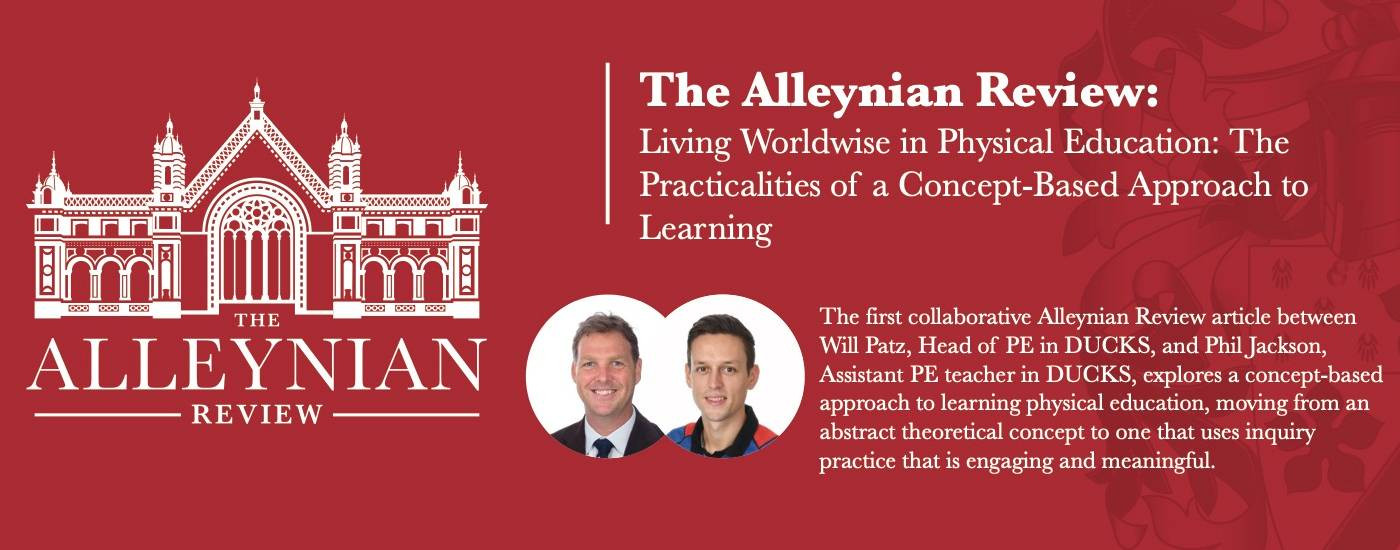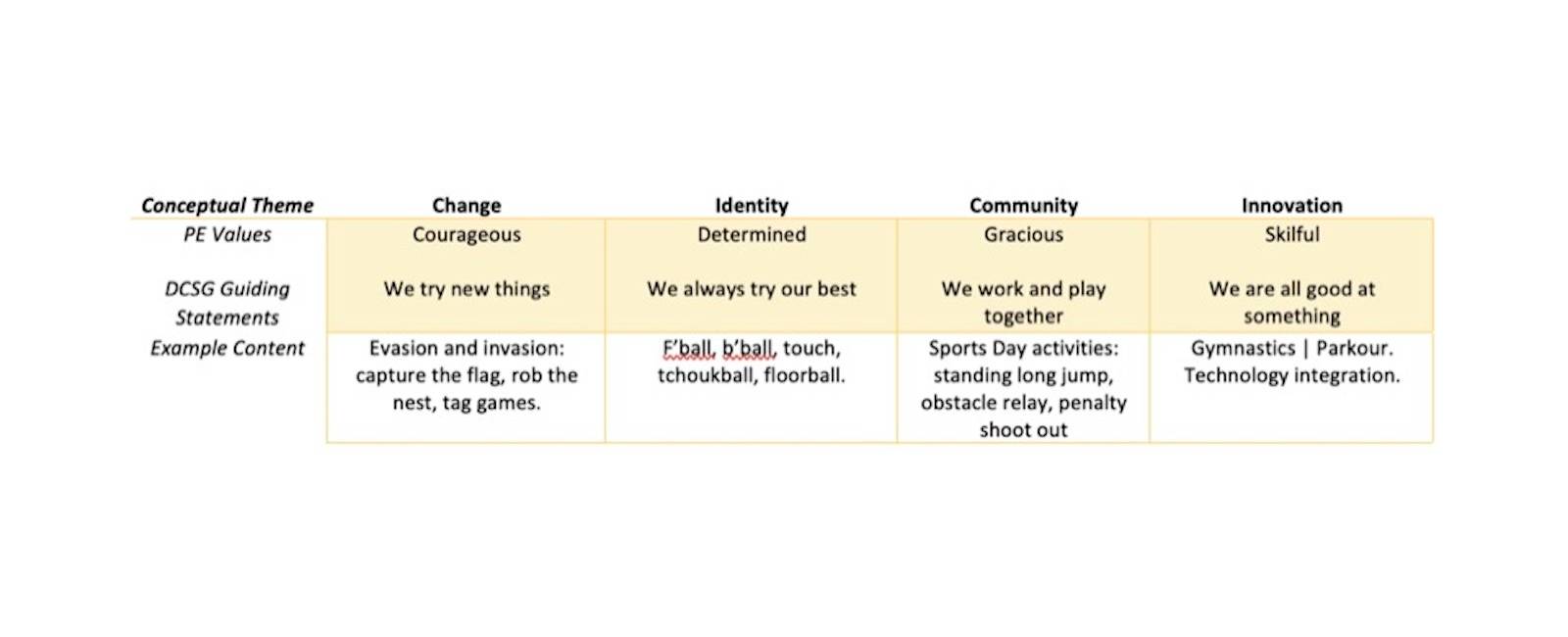The Practicalities of a Concept-Based Approach to Learning

The idea of a concept-based approach to learning in Physical Education (PE) has gained significant traction in the last twenty years, particularly among the international school community (Hill). For many teachers and academics, learning in PE is viewed as a social process grounded in active inquiry and exploration (Beni et al.). In a concept-based approach, sense and meaning making of knowledge are tied to past experiences and the generation of new ones. Educational philosopher John Dewey called for education to be a transforming experience that continually aims to cultivate educative experiences that lead to growth and further experiences (Dewey; Quennerstedt). However, taking a theoretical or abstract concept-based approach and applying it in a meaningful way is neither easy nor straightforward. Using several examples from DUCKS PE, this article considers how we move from a theoretical, abstract concept-based approach into actual inquiry practice and learning that is engaging and meaningful to students. Ultimately providing them with real skills that prepare them for an unpredictable and fast-changing world.
Setting the scene: what does it mean to Live Worldwise?
Young people are facing a myriad of contemporary issues that they, parents, and educators are adjusting to all the time. These issues may be mental health, emotional wellbeing, spiritual health, physical inactivity, climate crisis, and economic insecurity (Patton et al.). Operating in an unpredictable and continually evolving international environment is challenging in the 21st Century. Globalisation, changing demographics and technological advancements are affecting education, student learning and shaping the future of the world. The adults of tomorrow need a different set of skills and knowledge compared to their parents and their grandparents. Although not altogether surprising, the rate of change is perhaps the most significant marker. Climate crises, social justice, health, and responsible leadership are all substantial issues that are extremely complex and will be an inheritance for this current generation of students (Matthewman and Morgan). Their education, and those who impact upon it (i.e. family, friends, educators), is of importance as they navigate their way through these issues as adults.
To prepare students for the challenges ahead, we can look to the 21st Century skills as a means for preparing students for their future careers and citizenship. These skills are split into Learning Skills (critical thinking, creativity, collaboration, communication), Literacy Skills (information, media, technology), and Life Skills (flexibility, sustainable leadership, initiative, productivity, social skills). A student who is capable of Living Worldwise can ask considered questions, critically analyse information, form independent opinions, collaborate, and communicate effectively with a wide range of individuals. They are a responsible leader who contemplates sustainability, intercultural understanding, adaptability, and open-mindedness in their decision-making process. Fundamentally, students require an understanding of how to interact with others. Students who understand others’ needs are the students who can make a difference in the world as global citizens and guardians of the planet. Understanding the emotional and physical impact of their interactions with others is an important factor in this development. As a subject that can offer a broad, diverse curriculum, PE is ideally placed within the school to develop these skills, interactions, and to prepare students for the challenges that lie ahead through a concept-based approach (Stolz and Kirk).
Implementing a concept-based curriculum in PE
PE is ideally placed to make a significant impact on preparing students for the unpredictable and complex challenges that face their personal and professional futures. It is a subject that students take part in from the start of their school life until they graduate, it offers students multiple environments in which to learn and interact. Educational philosopher John Dewey explained how individuals learn from their experiences through the interactions and transactions that take place in everyday life (Dewey; Goodyear and Quennerstedt). Dewey’s aim was to make education a transforming experience, which would then lead to further growth and experiences (Quennerstedt). When those experiences are meaningful (i.e. fun, challenging, social, physically active, and personally relevant), learning takes place (Beni, et al., 2019). PE has the potential to prepare students for the world beyond formal education due to its ability to vary the environment, equipment, and interactions within a single lesson or across a curriculum. Therefore, the curriculum guiding this practice must be broad and take into account the plethora of students backgrounds, needs and wants.
Traditionally, PE has been viewed as a multi-activity, sport-as-technique subject that implicitly builds character through sport and competition (Stolz and Kirk). Sport and competition have a place in the PE curriculum and the school as a whole, but many myths such as sport builds character have long been critiqued and dismissed by academics and practitioners (Hellison). In place of this type of curriculum, a concept-based approach offers students and educators flexibility in the learning process, tailoring it to their context and preferences (see Fig.1). Using concepts such as Change offers a wide path in which to travel on our learning journey rather than the narrow sport-as-technique curriculum. The learning aims of a concept-based lesson plan re-adjusts from sport skill development (e.g. passing a football, throwing a cricket ball) to the values and guiding statements of the school. For example, one PE value at Dulwich College (Singapore) is for students to be Courageous. The College’s guiding statement that links with this is that ‘we understand meaningful, lifelong learning involves taking risks’, in DUCKS ‘we try new things’.

Fig.1 DUCKS School Physical Education Curriculum Overview
Using this vocabulary, explicitly rather than implicitly, allows students to interpret their own meaning of the value or guiding statement, and with the teacher facilitating, how to implement it in practice in a PE lesson. Student-teacher and student-student interactions can evolve the conversation regarding what it means to be Courageous or take risks, critiquing the appropriateness and application to a PE lesson. For example, in a tag game or similar evasion game, is it courageous to run away from a tagger to avoid being tagged. The reward of saving a teammate who has been tagged requires taking a risk, in comparison to a student who is never tagged but adopts a low-risk strategy by not coming to the aid of stricken teammates. The act of running away may allow them to save teammates that were caught. In this situation, students offer a variety of explanations, arguments, and interpretations of what should be done, how, and why. It creates dialogue, advances our understanding by engaging with multiple perspectives, driving versatility in a rapidly changing environment. It is in these interactions and transactions, as Dewey puts it, that the learning process takes place with meaningful knowledge developed in a PE context (Beni et al.; Goodyear and Quennerstedt).
Encouraging students to think conceptually and to critique the application of the PE values in practice can allow educators to take another step in the development of transferable skills. In DUCKS PE, students develop locomotion skills (running, jumping, hopping, skipping), animal movements (monkey walk, horse gallop, bunny hop, frog jump), and object manipulation (throw, catch, kick, strike) under the framework of a concept or theme. These physical skills are supported by the development of cognitive (problem-solving, decision making, communication, initiative) and affective (resilience, empathy, morality, emotional regulation) skills that educators purposely integrate into every lesson. For example, before students enter the gym, they do a ‘check in’, tapping on a poster that displays a variety of colour coordinated feelings and emotions (see Fig.2). This provides an opportunity for students to share their feelings at that moment with the teacher but also to reflect on how they are feeling in that moment. As teachers, we have a chance to tailor our discussions and activities to individuals and classes depending on how they’re feeling. This feeds into team games, individual physical activities, and sports-specific events such as Sports Week can provide students with opportunities to practice and hone these skills in lessons before applying them in a competitive environment. Explicitly teaching how an individual may regulate their emotions when they win or lose a game, is possible when deliberately planned for, communicated, ingrained in every aspect of the curriculum, and integrated into student assessment. Acknowledging the feelings and thoughts that students may have, discussing them, and applying them to authentic, meaningful situations extends the learning process.
Fig.2 Feelings and Emotions Check-In
Summary
Within an international school context, a concept-based curriculum is not uncommon. It is the planning, delivery, and link to wider-school practices of those concepts that can make it unique and useful to students. In DUCKS PE we have started developing the concepts to make them meaningful for students when undertaking physical activity. Beyond this, we explicitly link the concepts to our PE values (Determined, Courageous, Skilful, and Gracious) and the College guiding statements. Teaching a value-driven, concept-based curriculum creates broad discussions, experiences, and interactions between students, teachers, and the environment. PE is placed perfectly in the College as a vehicle to guide and support students’ learning outcomes in physical, cognitive, affective, and social domains. The focus on motor skills does not need to deter the development of 21st Century skills. Critical thinking, collaboration, communication and other skills are integral to an engaging and meaningful PE experience. Ultimately, we wish for students to remain physically active throughout their life and to utilise their skills as responsible, adaptable, open-minded global citizens and leaders.
Works cited
Beni, Stephanie, et al. “Using Features of Meaningful Experiences to Guide Primary Physical Education Practice.” European Physical Education Review, vol. 25, no. 3, 2019, pp. 599–615, doi:10.1177/1356336X18755050.
Dewey, J. Experience and Education. Touchstone, 1938.
Goodyear, Victoria, and Mikael Quennerstedt. “#Gymlad - Young Boys Learning Processes and Health-Related Social Media.” Qualitative Research in Sport, Exercise and Health, vol. 12, no. 1, 2020, pp. 18–33, doi:10.1080/2159676X.2019.1673470.
Hellison, Don. “The Affective Domain in Education.” Journal of Physical Education, Recreation & Dance, vol. 58, no. 6, 1987, pp. 41–43, doi:10.1080/07303084.1987.10609571.
Hill, Ian. “Evolution of Education for International Mindedness.” Journal of Research in International Education, vol. 11, no. 3, 2012, pp. 245–61, doi:10.1177/1475240912461990.
Matthewman, Sasha, and John Morgan. “The Post-Carbon Challenge for Curriculum Subjects.” International Journal of Educational Research, vol. 61, 2013, pp. 93–100, doi:10.1016/j.ijer.2013.03.012.
Patton, George C., et al. “Our Future: A Lancet Commission on Adolescent Health and Wellbeing.” Lancet, vol. 387, 2016, pp. 2423–78, doi:10.1016/S0140-6736(16)00579-1.
Quennerstedt, Mikael. “Physical Education and the Art of Teaching: Transformative Learning and Teaching in Physical Education and Sports Pedagogy.” Sport, Education and Society, vol. 24, no. 6, 2019, pp. 611–23, doi:10.1080/13573322.2019.1574731.
Stolz, Steven A., and David Kirk. “David Kirk on Physical Education and Sport Pedagogy: In Dialogue with Steven Stolz (Part 2).” Asia-Pacific Journal of Health, Sport and Physical Education, vol. 6, no. 2, 2015, pp. 127–42, doi:10.1080/18377122.2014.997862.





